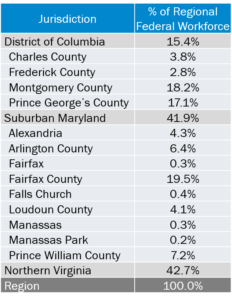WASHINGTON — Furloughed feds and contractors who call the D.C. area home are sprinkled throughout the region, and the partial government shutdown is affecting local economies, said the Metropolitan Washington Council of Governments.
“A lot of the effect of the shutdown is nongovernmental,” said Fairfax County Supervisor Penny A. Gross at a Council of Governments meeting Wednesday.

Gross is concerned about small businesses.
“Folks aren’t working — they’re not going to be going to lunch, they’re not going to be going to carry-outs, picking up their lunch and taking it back to their office,” she said.
Prince George’s County Council Member Derrick Leon Davis, a vice chair of the COG Board, agreed the pain is real.
“The anecdotal realities are out there,” Davis said, citing downstream effects when people stop visiting community businesses as usual. “In our dry cleaners, our restaurants, all of your Uber drivers, you name it — there is a strain on this region.”
Local budgets might suffer
The shutdown is beginning to affect the sales tax revenue that many jurisdictions include in budget projections.
“If (the shutdown) goes to a month, that’s 1/12th of our budget year,” Gross said.
Falls Church Council Member David Snyder said at the meeting that the owner of a D.C. sandwich shop he visits frequently said her business was down 20 percent compared to last year.
City of Fairfax Mayor David L. Meyer said charitable services provided by the 11 churches in his city are at risk. They do everything from providing emergency shelter to helping people with rent, clothes and food.
“Cash flow to those congregations is very sensitive to the local economy,” Meyer said. “They serve the most vulnerable people in our communities.”
Letter to leaders
In a letter to President Donald Trump, Senate Majority Leader Mitch McConnell and House Speaker Nancy Pelosi, COG leaders appealed for an end to the shutdown.
“With each passing day, the shutdown increasingly impacts Washington, D.C., Maryland and Virginia causing unnecessary to our citizens, businesses and the regional economy,” the letter said.
“Please act now to solve this impasse and put all federal employees and contractors — and our entire region — back to work in the service of our nation and the general public.”
What if this drags on?
If the shutdown persists, localities and nonprofits might collaborate to help furloughed workers and others.
Next week, COG is sponsoring a meeting of local human service directors and the United Way of the National Capital Area that created an emergency assistance fund during the shutdown of 2013.







